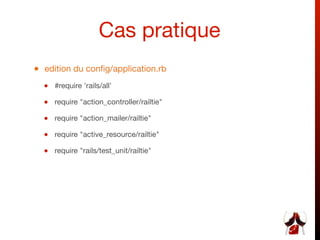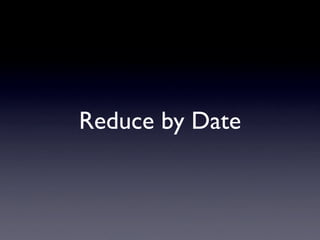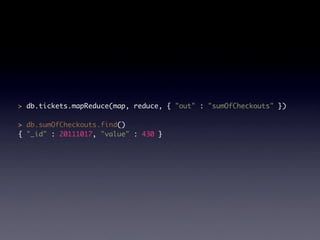Apéro RubyBdx - MongoDB - 8-11-2011
- 1. Pierre-Louis Gottfrois Bastien Murzeau Apéro Ruby Bordeaux, 8 novembre 2011
- 2. • Brève introduction • Cas pratique • Map / Reduce
- 3. Qu’est ce que mongoDB ? mongoDB est une base de donnée de type NoSQL, sans schéma document-oriented
- 4. sans-schéma • Très utile en développements ‘agiles’ (itérations, rapidité de modifications, flexibilité pour les développeurs) • Supporte des fonctionnalités qui seraient, en BDDs relationnelles : • quasi-impossible (stockage d’éléments non finis, ex. tags) • trop complexes pour ce qu’elles sont (migrations)
- 5. document-oriented • mongoDB stocke des documents, pas de rows • les documents sont stockés sous forme de JSON; binary JSON • la syntaxe de requêtage est aussi fournie que SQL • le mécanisme de documents ‘embedded’ résout bon nombre de problèmes rencontrés
- 6. document-oriented • Les documents sont stockés dans une collection, en RoR = model • une partie des ces données sont indexées pour optimiser les performances • un document n’est pas une poubelle !
- 7. stockage de données volumineuses • mongoDB (et autres NoSQL) sont plus performantes pour la scalabilité horizontale • ajout de serveurs pour augmenter la capacité de stockage («sharding») • garantissant ainsi une meilleur disponibilité • load-balancing optimisé entre les nodes • augmentation transparente pour l’application
- 8. Cas pratique • ORM devient ODM, la gem de référence mongoid • ou : mongoMapper, DataMapper • Création d’une application a base de NoSQL MongoDB • rails new nosql • edition du Gemfile • gem ‘mongoid’ • gem ‘bson_ext’ • bundle install • rails generate mongoid:config
- 9. Cas pratique • edition du config/application.rb • #require 'rails/all' • require "action_controller/railtie" • require "action_mailer/railtie" • require "active_resource/railtie" • require "rails/test_unit/railtie"
- 10. Cas pratique class Subject include Mongoid::Document include Mongoid::Timestamps has_many :scores, :as => :scorable, :dependent => :delete, :autosave => true has_many :requests, :dependent => :delete belongs_to :author, :class_name => 'User' class Conversation include Mongoid::Document include Mongoid::Timestamps field :public, :type => Boolean, :default => false has_many :scores, :as => :scorable, :dependent => :delete has_and_belongs_to_many :subjects belongs_to :timeline embeds_many :messages
- 11. Map Reduce
- 12. Example A “ticket” collection { { { { “id” : 1, “id” : 2, “id” : 3, “id” : 4, “day” : 20111017, “day” : 20111017, “day” : 20111017, “day” : 20111017, “checkout” : 100 “checkout” : 42 “checkout” : 215 “checkout” : 73 } } } }
- 13. Problematic • We want to • Calculate the ‘checkout’ sum of each object in our ticket’s collection • Be able to distribute this operation over the network • Be fast! • We don’t want to • Go over all objects again when an update is made
- 14. Map : emit(checkout) The ‘map’ function emit (select) every checkout value of each object in our collection 100 42 215 73 { { { { “id” : 1, “id” : 2, “id” : 3, “id” : 4, “day” : 20111017, “day” : 20111017, “day” : 20111017, “day” : 20111017, “checkout” : 100 “checkout” : 42 “checkout” : 215 “checkout” : 73 } } } }
- 15. Reduce : sum(checkout) 430 142 288 100 42 215 73 { { { { “id” : 1, “id” : 2, “id” : 3, “id” : 4, “day” : 20111017, “day” : 20111017, “day” : 20111017, “day” : 20111017, “checkout” : 100 “checkout” : 42 “checkout” : 215 “checkout” : 73 } } } }
- 16. Reduce function The ‘reduce’ function apply the algorithmic logic for each key/value received from ‘map’ function This function has to be ‘idempotent’ to be called recursively or in a distributed system reduce(k, A, B) == reduce(k, B, A) reduce(k, A, B) == reduce(k, reduce(A, B))
- 17. Inherently Distributed 430 142 288 100 42 215 73 { { { { “id” : 1, “id” : 2, “id” : 3, “id” : 4, “day” : 20111017, “day” : 20111017, “day” : 20111017, “day” : 20111017, “checkout” : 100 “checkout” : 42 “checkout” : 215 “checkout” : 73 } } } }
- 18. Distributed Since ‘map’ function emits objects to be reduced and ‘reduce’ function processes for each emitted objects independently, it can be distributed through multiple workers. map reduce
- 19. Logaritmic Update For the same reason, when updating an object, we don’t have to reprocess for each obejcts. We can call ‘map’ function only on updated objects.
- 20. Logaritmic Update 430 142 288 100 42 215 73 { { { { “id” : 1, “id” : 2, “id” : 3, “id” : 4, “day” : 20111017, “day” : 20111017, “day” : 20111017, “day” : 20111017, “checkout” : 100 “checkout” : 42 “checkout” : 210 “checkout” : 73 } } } }
- 21. Logaritmic Update 430 142 288 100 42 210 73 { { { { “id” : 1, “id” : 2, “id” : 3, “id” : 4, “day” : 20111017, “day” : 20111017, “day” : 20111017, “day” : 20111017, “checkout” : 100 “checkout” : 42 “checkout” : 210 “checkout” : 73 } } } }
- 22. Logaritmic Update 430 142 283 100 42 210 73 { { { { “id” : 1, “id” : 2, “id” : 3, “id” : 4, “day” : 20111017, “day” : 20111017, “day” : 20111017, “day” : 20111017, “checkout” : 100 “checkout” : 42 “checkout” : 210 “checkout” : 73 } } } }
- 23. Logarithmic Update 425 142 283 100 42 210 73 { { { { “id” : 1, “id” : 2, “id” : 3, “id” : 4, “day” : 20111017, “day” : 20111017, “day” : 20111017, “day” : 20111017, “checkout” : 100 “checkout” : 42 “checkout” : 210 “checkout” : 73 } } } }
- 24. Let’s do some code!
- 25. $> mongo > db.tickets.save({ "_id": 1, "day": 20111017, "checkout": 100 }) > db.tickets.save({ "_id": 2, "day": 20111017, "checkout": 42 }) > db.tickets.save({ "_id": 3, "day": 20111017, "checkout": 215 }) > db.tickets.save({ "_id": 4, "day": 20111017, "checkout": 73 }) > db.tickets.count() 4 > db.tickets.find() { "_id" : 1, "day" : 20111017, "checkout" : 100 } ... > db.tickets.find({ "_id": 1 }) { "_id" : 1, "day" : 20111017, "checkout" : 100 }
- 26. > var map = function() { ... emit(null, this.checkout) } > var reduce = function(key, values) { ... var sum = 0 ... for (var index in values) sum += values[index] ... return sum }
- 27. Temporary Collection > sumOfCheckouts = db.tickets.mapReduce(map, reduce) { "result" : "tmp.mr.mapreduce_123456789_4", "timeMills" : 8, "counts" : { "input" : 4, "emit" : 4, "output" : 1 }, "ok" : 1 } > db.getCollectionNames() [ "tickets", "tmp.mr.mapreduce_123456789_4" ] > db[sumOfCheckouts.result].find() { "_id" : null, "value" : 430 }
- 28. Persistent Collection > db.tickets.mapReduce(map, reduce, { "out" : "sumOfCheckouts" }) > db.getCollectionNames() [ "sumOfCheckouts", "tickets", "tmp.mr.mapreduce_123456789_4" ] > db.sumOfCheckouts.find() { "_id" : null, "value" : 430 } > db.sumOfCheckouts.findOne().value 430
- 29. Reduce by Date
- 30. > var map = function() { ... emit(this.date, this.checkout) } > var reduce = function(key, values) { ... var sum = 0 ... for (var index in values) sum += values[index] ... return sum }
- 31. > db.tickets.mapReduce(map, reduce, { "out" : "sumOfCheckouts" }) > db.sumOfCheckouts.find() { "_id" : 20111017, "value" : 430 }
- 32. What we can do
- 33. Scored Subjects per User Subject User Score 1 1 2 1 1 2 1 2 2 2 1 2 2 2 10 2 2 5
- 34. Scored Subjects per User (reduced) Subject User Score 1 1 4 1 2 2 2 1 2 2 2 15
- 35. $> mongo > db.scores.save({ "_id": 1, "subject_id": 1, "user_id": 1, "score": 2 }) > db.scores.save({ "_id": 2, "subject_id": 1, "user_id": 1, "score": 2 }) > db.scores.save({ "_id": 3, "subject_id": 1, "user_id": 2, "score": 2 }) > db.scores.save({ "_id": 4, "subject_id": 2, "user_id": 1, "score": 2 }) > db.scores.save({ "_id": 5, "subject_id": 2, "user_id": 2, "score": 10 }) > db.scores.save({ "_id": 6, "subject_id": 2, "user_id": 2, "score": 5 }) > db.scores.count() 6 > db.scores.find() { "_id": 1, "subject_id": 1, "user_id": 1, "score": 2 } ... > db.scores.find({ "_id": 1 }) { "_id": 1, "subject_id": 1, "user_id": 1, "score": 2 }
- 36. > var map = function() { ... emit([this.user_id, this.subject_id].join("-"), {subject_id:this.subject_id, ... user_id:this.user_id, score:this.score}); } > var reduce = function(key, values) { ... var result = {user_id:"", subject_id:"", score:0}; ... values.forEach(function (value) {result.score += value.score;result.user_id = ... value.user_id;result.subject_id = value.subject_id;}); ... return result }
- 37. ReducedScores Collection > db.scores.mapReduce(map, reduce, { "out" : "reduced_scores" }) > db.getCollectionNames() [ "reduced_scores", "scores" ] > db.reduced_scores.find() { "_id" : "1-1", "value" : { "user_id" : 1, "subject_id" : 1, "score" : 4 } } { "_id" : "1-2", "value" : { "user_id" : 1, "subject_id" : 2, "score" : 2 } } { "_id" : "2-1", "value" : { "user_id" : 2, "subject_id" : 1, "score" : 2 } } { "_id" : "2-2", "value" : { "user_id" : 2, "subject_id" : 2, "score" : 15 } } > db.reduced_scores.findOne().score 4
- 38. Dealing with Rails Query ruby-1.9.2-p180 :007 > ReducedScores.first => #<ReducedScores _id: 1-1, _type: nil, value: {"user_id"=>BSON::ObjectId('...'), "subject_id"=>BSON::ObjectId('...'), "score"=>4.0}> ruby-1.9.2-p180 :008 > ReducedScores.where("value.user_id" => u1.id).count => 2 ruby-1.9.2-p180 :009 > ReducedScores.where("value.user_id" => u1.id).first.value['score'] => 4.0 ruby-1.9.2-p180 :010 > ReducedScores.where("value.user_id" => u1.id).last.value['score'] => 2.0
- 39. Questions ?

























![> var map = function() {
... emit(null, this.checkout)
}
> var reduce = function(key, values) {
... var sum = 0
... for (var index in values) sum += values[index]
... return sum
}](https://image.slidesharecdn.com/aprorubybordeaux-mongodb-8novembre2011-111108111923-phpapp02/85/Apero-RubyBdx-MongoDB-8-11-2011-26-320.jpg)
![Temporary Collection
> sumOfCheckouts = db.tickets.mapReduce(map, reduce)
{
"result" : "tmp.mr.mapreduce_123456789_4",
"timeMills" : 8,
"counts" : { "input" : 4, "emit" : 4, "output" : 1 },
"ok" : 1
}
> db.getCollectionNames()
[
"tickets",
"tmp.mr.mapreduce_123456789_4"
]
> db[sumOfCheckouts.result].find()
{ "_id" : null, "value" : 430 }](https://image.slidesharecdn.com/aprorubybordeaux-mongodb-8novembre2011-111108111923-phpapp02/85/Apero-RubyBdx-MongoDB-8-11-2011-27-320.jpg)
![Persistent Collection
> db.tickets.mapReduce(map, reduce, { "out" : "sumOfCheckouts" })
> db.getCollectionNames()
[
"sumOfCheckouts",
"tickets",
"tmp.mr.mapreduce_123456789_4"
]
> db.sumOfCheckouts.find()
{ "_id" : null, "value" : 430 }
> db.sumOfCheckouts.findOne().value
430](https://image.slidesharecdn.com/aprorubybordeaux-mongodb-8novembre2011-111108111923-phpapp02/85/Apero-RubyBdx-MongoDB-8-11-2011-28-320.jpg)

![> var map = function() {
... emit(this.date, this.checkout)
}
> var reduce = function(key, values) {
... var sum = 0
... for (var index in values) sum += values[index]
... return sum
}](https://image.slidesharecdn.com/aprorubybordeaux-mongodb-8novembre2011-111108111923-phpapp02/85/Apero-RubyBdx-MongoDB-8-11-2011-30-320.jpg)





![> var map = function() {
... emit([this.user_id, this.subject_id].join("-"), {subject_id:this.subject_id,
... user_id:this.user_id, score:this.score});
}
> var reduce = function(key, values) {
... var result = {user_id:"", subject_id:"", score:0};
... values.forEach(function (value) {result.score += value.score;result.user_id =
... value.user_id;result.subject_id = value.subject_id;});
... return result
}](https://image.slidesharecdn.com/aprorubybordeaux-mongodb-8novembre2011-111108111923-phpapp02/85/Apero-RubyBdx-MongoDB-8-11-2011-36-320.jpg)
![ReducedScores
Collection
> db.scores.mapReduce(map, reduce, { "out" : "reduced_scores" })
> db.getCollectionNames()
[
"reduced_scores",
"scores"
]
> db.reduced_scores.find()
{ "_id" : "1-1", "value" : { "user_id" : 1, "subject_id" : 1, "score" : 4 } }
{ "_id" : "1-2", "value" : { "user_id" : 1, "subject_id" : 2, "score" : 2 } }
{ "_id" : "2-1", "value" : { "user_id" : 2, "subject_id" : 1, "score" : 2 } }
{ "_id" : "2-2", "value" : { "user_id" : 2, "subject_id" : 2, "score" : 15 } }
> db.reduced_scores.findOne().score
4](https://image.slidesharecdn.com/aprorubybordeaux-mongodb-8novembre2011-111108111923-phpapp02/85/Apero-RubyBdx-MongoDB-8-11-2011-37-320.jpg)
![Dealing with Rails Query
ruby-1.9.2-p180 :007 > ReducedScores.first
=> #<ReducedScores _id: 1-1, _type: nil, value: {"user_id"=>BSON::ObjectId('...'),
"subject_id"=>BSON::ObjectId('...'), "score"=>4.0}>
ruby-1.9.2-p180 :008 > ReducedScores.where("value.user_id" => u1.id).count
=> 2
ruby-1.9.2-p180 :009 > ReducedScores.where("value.user_id" => u1.id).first.value['score']
=> 4.0
ruby-1.9.2-p180 :010 > ReducedScores.where("value.user_id" => u1.id).last.value['score']
=> 2.0](https://image.slidesharecdn.com/aprorubybordeaux-mongodb-8novembre2011-111108111923-phpapp02/85/Apero-RubyBdx-MongoDB-8-11-2011-38-320.jpg)
